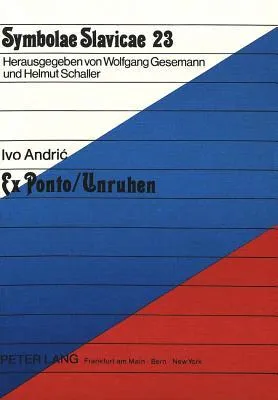Ex ponto/Unruhen (Symbolae Slavicae)
By (author): "Ivo Andri?"
Publish Date:
1920
ISBN3631417160
ISBN139783631417164
AsinEx ponto/Unruhen (Symbolae Slavicae)
Original titleEx Ponto, Nemiri, Lirika
=From the Sea: Riots; LyricsAndri?’s 1st published works were poems and he continued to write verse intermittenly all his life, altho much of it was unpublished until his death. His 1st poems appeared in the context of the Young Bosnia movement. The writing of its members is in marked contrast to their robust active personalities. The poems Andri? published before WWI are virtually indistinguishable in tone from much of what his contemporaries were writing. Nevertheless, it's probably true to say that in his case the role of the political activist, however sincerely he played it at the time, was fundamentally unsuited to him. By contrast, however, the prevailing melancholy seemed to match his temperamental reponse to the world. These early poems point in no particular direction, beyond establishing the free verse form of virtually all of Andri?’s poetry and a tendency to a mournful self-pity which sometimes threatens his personal statements. The prose poems written during the War represent a personal conffesion & cannot be considered merely the reflection of a literary vogue. “Ex Ponto” (refers to Ovid’s account of his Black Sea exile) was published in 1918; “Unrest” in 1920, when “Ex Ponto” was already reprinted. Thereafter Andri? refused to allow them to be included in any of his collections of his works published before his death. He rejected them because they seemed to him too intimate. But, they're important since they contain ideas & themes which recur in his later works. The strong emotional colouring was toned down in Andri?’s later prose poems & verse but their form, a combination of aphoristic statements & longer reflective passages, continued to appeal to him. “Ex Ponto” & “Unrest” record his emotional reaction to the circumstances of his early life & the development of a number of themes around the central paradox of his personality & work.
